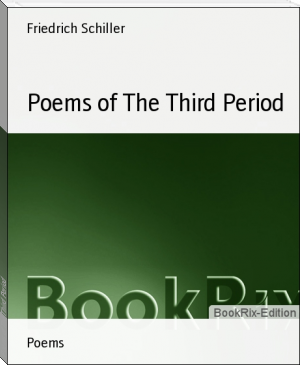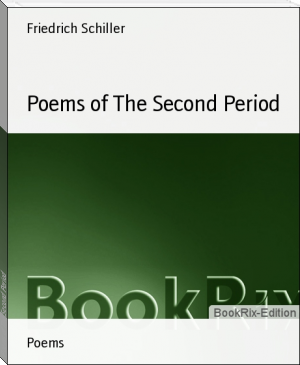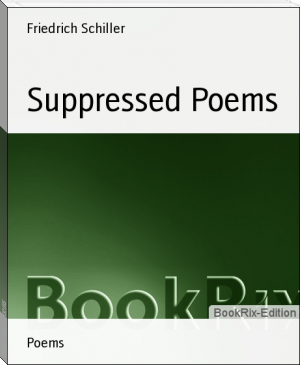Poems of The Third Period - Friedrich Schiller (10 best books of all time .txt) 📗

- Author: Friedrich Schiller
Book online «Poems of The Third Period - Friedrich Schiller (10 best books of all time .txt) 📗». Author Friedrich Schiller
/> But did the oracle itself not add,
That he who did so would behold the truth?
Whate'er is hid behind, I'll raise the veil."
And then he shouted: "Yes! I will behold it!"
"Behold it!"
Repeats in mocking tone the distant echo.
He speaks, and, with the word, lifts up the veil.
Would you inquire what form there met his eye?
I know not, - but, when day appeared, the priests
Found him extended senseless, pale as death,
Before the pedestal of Isis' statue.
What had been seen and heard by him when there
He never would disclose, but from that hour
His happiness in life had fled forever,
And his deep sorrow soon conducted him
To an untimely grave. "Woe to that man,"
He warning said to every questioner,
"Woe to that man who wins the truth by guilt,
For truth so gained will ne'er reward its owner."
THE DIVISION OF THE EARTH.
"Take the world!" Zeus exclaimed from his throne in the skies
To the children of man - "take the world I now give;
It shall ever remain as your heirloom and prize,
So divide it as brothers, and happily live."
Then all who had hands sought their share to obtain,
The young and the aged made haste to appear;
The husbandman seized on the fruits of the plain,
The youth through the forest pursued the fleet deer.
The merchant took all that his warehouse could hold,
The abbot selected the last year's best wine,
The king barred the bridges, - the highways controlled,
And said, "Now remember, the tithes shall be mine!"
But when the division long-settled had been,
The poet drew nigh from a far distant land;
But alas! not a remnant was now to be seen,
Each thing on the earth owned a master's command.
"Alas! shall then I, of thy sons the most true, -
Shall I, 'mongst them all, be forgotten alone?"
Thus loudly he cried in his anguish, and threw
Himself in despair before Jupiter's throne.
"If thou in the region of dreams didst delay,
Complain not of me," the Immortal replied;
"When the world was apportioned, where then wert thou, pray?"
"I was," said the poet, "I was - by thy side!"
"Mine eye was then fixed on thy features so bright,
Mine ear was entranced by thy harmony's power;
Oh, pardon the spirit that, awed by thy light,
All things of the earth could forget in that hour!"
"What to do?" Zeus exclaimed, - "for the world has been given;
The harvest, the market, the chase, are not free;
But if thou with me wilt abide in my heaven,
Whenever thou comest, 'twill be open to thee!"
THE FAIREST APPARITION.
If thou never hast gazed upon beauty in moments of sorrow,
Thou canst with truth never boast that thou true beauty hast seen.
If thou never hast gazed upon gladness in beauteous features,
Thou canst with truth never boast that thou true gladness hast seen.
THE IDEAL AND THE ACTUAL LIFE.
Forever fair, forever calm and bright,
Life flies on plumage, zephyr-light,
For those who on the Olympian hill rejoice -
Moons wane, and races wither to the tomb,
And 'mid the universal ruin, bloom
The rosy days of Gods - With man, the choice,
Timid and anxious, hesitates between
The sense's pleasure and the soul's content;
While on celestial brows, aloft and sheen,
The beams of both are blent.
Seekest thou on earth the life of gods to share,
Safe in the realm of death? - beware
To pluck the fruits that glitter to thine eye;
Content thyself with gazing on their glow -
Short are the joys possession can bestow,
And in possession sweet desire will die.
'Twas not the ninefold chain of waves that bound
Thy daughter, Ceres, to the Stygian river -
She plucked the fruit of the unholy ground,
And so - was hell's forever!
The weavers of the web - the fates - but sway
The matter and the things of clay;
Safe from change that time to matter gives,
Nature's blest playmate, free at will to stray
With gods a god, amidst the fields of day,
The form, the archetype [39], serenely lives.
Would'st thou soar heavenward on its joyous wing?
Cast from thee, earth, the bitter and the real,
High from this cramped and dungeon being, spring
Into the realm of the ideal!
Here, bathed, perfection, in thy purest ray,
Free from the clogs and taints of clay,
Hovers divine the archetypal man!
Dim as those phantom ghosts of life that gleam
And wander voiceless by the Stygian stream, -
Fair as it stands in fields Elysian,
Ere down to flesh the immortal doth descend: -
If doubtful ever in the actual life
Each contest - here a victory crowns the end
Of every nobler strife.
Not from the strife itself to set thee free,
But more to nerve - doth victory
Wave her rich garland from the ideal clime.
Whate'er thy wish, the earth has no repose -
Life still must drag thee onward as it flows,
Whirling thee down the dancing surge of time.
But when the courage sinks beneath the dull
Sense of its narrow limits - on the soul,
Bright from the hill-tops of the beautiful,
Bursts the attained goal!
If worth thy while the glory and the strife
Which fire the lists of actual life -
The ardent rush to fortune or to fame,
In the hot field where strength and valor are,
And rolls the whirling thunder of the car,
And the world, breathless, eyes the glorious game -
Then dare and strive - the prize can but belong
To him whose valor o'er his tribe prevails;
In life the victory only crowns the strong -
He who is feeble fails.
But life, whose source, by crags around it piled,
Chafed while confined, foams fierce and wild,
Glides soft and smooth when once its streams expand,
When its waves, glassing in their silver play,
Aurora blent with Hesper's milder ray,
Gain the still beautiful - that shadow-land!
Here, contest grows but interchange of love,
All curb is but the bondage of the grace;
Gone is each foe, - peace folds her wings above
Her native dwelling-place.
When, through dead stone to breathe a soul of light,
With the dull matter to unite
The kindling genius, some great sculptor glows;
Behold him straining, every nerve intent -
Behold how, o'er the subject element,
The stately thought its march laborious goes!
For never, save to toil untiring, spoke
The unwilling truth from her mysterious well -
The statue only to the chisel's stroke
Wakes from its marble cell.
But onward to the sphere of beauty - go
Onward, O child of art! and, lo!
Out of the matter which thy pains control
The statue springs! - not as with labor wrung
From the hard block, but as from nothing sprung -
Airy and light - the offspring of the soul!
The pangs, the cares, the weary toils it cost
Leave not a trace when once the work is done -
The Artist's human frailty merged and lost
In art's great victory won! [40]
If human sin confronts the rigid law
Of perfect truth and virtue [41], awe
Seizes and saddens thee to see how far
Beyond thy reach, perfection; - if we test
By the ideal of the good, the best,
How mean our efforts and our actions are!
This space between the ideal of man's soul
And man's achievement, who hath ever past?
An ocean spreads between us and that goal,
Where anchor ne'er was cast!
But fly the boundary of the senses - live
The ideal life free thought can give;
And, lo, the gulf shall vanish, and the chill
Of the soul's impotent despair be gone!
And with divinity thou sharest the throne,
Let but divinity become thy will!
Scorn not the law - permit its iron band
The sense (it cannot chain the soul) to thrall.
Let man no more the will of Jove withstand [42],
And Jove the bolt lets fall!
If, in the woes of actual human life -
If thou could'st see the serpent strife
Which the Greek art has made divine in stone -
That he who did so would behold the truth?
Whate'er is hid behind, I'll raise the veil."
And then he shouted: "Yes! I will behold it!"
"Behold it!"
Repeats in mocking tone the distant echo.
He speaks, and, with the word, lifts up the veil.
Would you inquire what form there met his eye?
I know not, - but, when day appeared, the priests
Found him extended senseless, pale as death,
Before the pedestal of Isis' statue.
What had been seen and heard by him when there
He never would disclose, but from that hour
His happiness in life had fled forever,
And his deep sorrow soon conducted him
To an untimely grave. "Woe to that man,"
He warning said to every questioner,
"Woe to that man who wins the truth by guilt,
For truth so gained will ne'er reward its owner."
THE DIVISION OF THE EARTH.
"Take the world!" Zeus exclaimed from his throne in the skies
To the children of man - "take the world I now give;
It shall ever remain as your heirloom and prize,
So divide it as brothers, and happily live."
Then all who had hands sought their share to obtain,
The young and the aged made haste to appear;
The husbandman seized on the fruits of the plain,
The youth through the forest pursued the fleet deer.
The merchant took all that his warehouse could hold,
The abbot selected the last year's best wine,
The king barred the bridges, - the highways controlled,
And said, "Now remember, the tithes shall be mine!"
But when the division long-settled had been,
The poet drew nigh from a far distant land;
But alas! not a remnant was now to be seen,
Each thing on the earth owned a master's command.
"Alas! shall then I, of thy sons the most true, -
Shall I, 'mongst them all, be forgotten alone?"
Thus loudly he cried in his anguish, and threw
Himself in despair before Jupiter's throne.
"If thou in the region of dreams didst delay,
Complain not of me," the Immortal replied;
"When the world was apportioned, where then wert thou, pray?"
"I was," said the poet, "I was - by thy side!"
"Mine eye was then fixed on thy features so bright,
Mine ear was entranced by thy harmony's power;
Oh, pardon the spirit that, awed by thy light,
All things of the earth could forget in that hour!"
"What to do?" Zeus exclaimed, - "for the world has been given;
The harvest, the market, the chase, are not free;
But if thou with me wilt abide in my heaven,
Whenever thou comest, 'twill be open to thee!"
THE FAIREST APPARITION.
If thou never hast gazed upon beauty in moments of sorrow,
Thou canst with truth never boast that thou true beauty hast seen.
If thou never hast gazed upon gladness in beauteous features,
Thou canst with truth never boast that thou true gladness hast seen.
THE IDEAL AND THE ACTUAL LIFE.
Forever fair, forever calm and bright,
Life flies on plumage, zephyr-light,
For those who on the Olympian hill rejoice -
Moons wane, and races wither to the tomb,
And 'mid the universal ruin, bloom
The rosy days of Gods - With man, the choice,
Timid and anxious, hesitates between
The sense's pleasure and the soul's content;
While on celestial brows, aloft and sheen,
The beams of both are blent.
Seekest thou on earth the life of gods to share,
Safe in the realm of death? - beware
To pluck the fruits that glitter to thine eye;
Content thyself with gazing on their glow -
Short are the joys possession can bestow,
And in possession sweet desire will die.
'Twas not the ninefold chain of waves that bound
Thy daughter, Ceres, to the Stygian river -
She plucked the fruit of the unholy ground,
And so - was hell's forever!
The weavers of the web - the fates - but sway
The matter and the things of clay;
Safe from change that time to matter gives,
Nature's blest playmate, free at will to stray
With gods a god, amidst the fields of day,
The form, the archetype [39], serenely lives.
Would'st thou soar heavenward on its joyous wing?
Cast from thee, earth, the bitter and the real,
High from this cramped and dungeon being, spring
Into the realm of the ideal!
Here, bathed, perfection, in thy purest ray,
Free from the clogs and taints of clay,
Hovers divine the archetypal man!
Dim as those phantom ghosts of life that gleam
And wander voiceless by the Stygian stream, -
Fair as it stands in fields Elysian,
Ere down to flesh the immortal doth descend: -
If doubtful ever in the actual life
Each contest - here a victory crowns the end
Of every nobler strife.
Not from the strife itself to set thee free,
But more to nerve - doth victory
Wave her rich garland from the ideal clime.
Whate'er thy wish, the earth has no repose -
Life still must drag thee onward as it flows,
Whirling thee down the dancing surge of time.
But when the courage sinks beneath the dull
Sense of its narrow limits - on the soul,
Bright from the hill-tops of the beautiful,
Bursts the attained goal!
If worth thy while the glory and the strife
Which fire the lists of actual life -
The ardent rush to fortune or to fame,
In the hot field where strength and valor are,
And rolls the whirling thunder of the car,
And the world, breathless, eyes the glorious game -
Then dare and strive - the prize can but belong
To him whose valor o'er his tribe prevails;
In life the victory only crowns the strong -
He who is feeble fails.
But life, whose source, by crags around it piled,
Chafed while confined, foams fierce and wild,
Glides soft and smooth when once its streams expand,
When its waves, glassing in their silver play,
Aurora blent with Hesper's milder ray,
Gain the still beautiful - that shadow-land!
Here, contest grows but interchange of love,
All curb is but the bondage of the grace;
Gone is each foe, - peace folds her wings above
Her native dwelling-place.
When, through dead stone to breathe a soul of light,
With the dull matter to unite
The kindling genius, some great sculptor glows;
Behold him straining, every nerve intent -
Behold how, o'er the subject element,
The stately thought its march laborious goes!
For never, save to toil untiring, spoke
The unwilling truth from her mysterious well -
The statue only to the chisel's stroke
Wakes from its marble cell.
But onward to the sphere of beauty - go
Onward, O child of art! and, lo!
Out of the matter which thy pains control
The statue springs! - not as with labor wrung
From the hard block, but as from nothing sprung -
Airy and light - the offspring of the soul!
The pangs, the cares, the weary toils it cost
Leave not a trace when once the work is done -
The Artist's human frailty merged and lost
In art's great victory won! [40]
If human sin confronts the rigid law
Of perfect truth and virtue [41], awe
Seizes and saddens thee to see how far
Beyond thy reach, perfection; - if we test
By the ideal of the good, the best,
How mean our efforts and our actions are!
This space between the ideal of man's soul
And man's achievement, who hath ever past?
An ocean spreads between us and that goal,
Where anchor ne'er was cast!
But fly the boundary of the senses - live
The ideal life free thought can give;
And, lo, the gulf shall vanish, and the chill
Of the soul's impotent despair be gone!
And with divinity thou sharest the throne,
Let but divinity become thy will!
Scorn not the law - permit its iron band
The sense (it cannot chain the soul) to thrall.
Let man no more the will of Jove withstand [42],
And Jove the bolt lets fall!
If, in the woes of actual human life -
If thou could'st see the serpent strife
Which the Greek art has made divine in stone -
Free e-book «Poems of The Third Period - Friedrich Schiller (10 best books of all time .txt) 📗» - read online now
Similar e-books:





Comments (0)